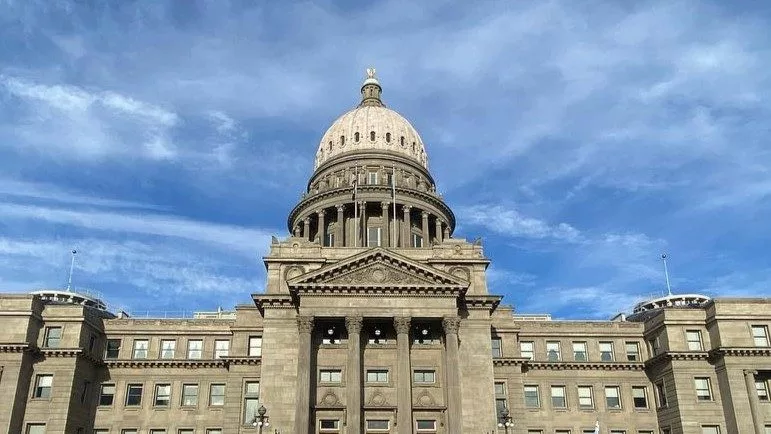BOISE, ID – About a month into the Idaho “DOGE” committee opening its public comment portal, more than 450 comments were submitted with recommendations on improving government efficiency.
Many of the submissions center around education, health care, and the committee and legislators.
Members of the interim committee — named for the federal Department of Government Efficiency — are sifting through submissions to the DOGE portal on the Idaho Legislature’s website. The next meeting is scheduled for 2 p.m. Sept. 29 at the Idaho Capitol in Boise.
Committee co-chairman Rep. Jeff Ehlers, R-Meridian, told the Idaho Capital Sun he plans to focus on ideas for restructuring or consolidating agencies. However, the nearly 500 comments are going to be delegated among the committee’s eight members for deeper dives and for responses to those who didn’t submit anonymously. The names of those who submitted were redacted in the records provided to the Sun through a public records request.
The committee is focused on reducing and reorganizing state government; it met for the first time in July, despite a bill that sought to create the committee stalling in the Legislature, the Sun reported.
What do the DOGE commenters think of the committee?
The Sun reviewed the 462 comments submitted to the DOGE portal between July 25 and Aug. 25.
The comments ranged in topics from asking to eliminate mosquito abatement districts, complaining about local government entities and decisions, to suggesting all the lawmakers resign.
More than 50 submissions suggested the committee dissolve itself.
“Disband Idaho DOGE — this state already runs at razor-thin funding for essential services,” one submitter wrote. “It’s a performative political stunt.”
Another submitter wrote, “Just don’t do this. Nothing is getting more efficient and naming a governing body after a meme is just insane,” referring to the popular mid-2000s meme featuring a photo of a Shiba Inu side-eying the camera.
Ehlers said he plans to address comments like these, many of which he believes stem from a misunderstanding about how the committee works.
“Anytime you’re making change, people are going to get worried or concerned, and I think that’s behind some of those comments,” he said. “That’s fine, people can have their opinions about us and the work that we’re doing.”
As state legislators, Ehlers said, their salaries are fixed and the committee members are not being paid more to meet out of the usual three-month legislative session. He said the staff who are working with the committee are also not being paid extra to do their work.
“It’s not like we’re really spending additional taxpayer dollars holding this committee,” he said.
Other commenters expressed support for the idea of improving government efficiency, but asked the committee to do so with a more fine-toothed comb than its federal predecessor, formerly led by billionaire Elon Musk, which oversaw mass layoffs and cuts in a short period of time.
“I urge you to consider re-evaluating the Doge system with genuine community input, transparent communication, and a plan grounded in practical outcomes for citizens,” one submission said. “Otherwise, it risks becoming just another example of government inefficiency.”
Some expressed gratitude for the effort and the ability to provide input.
“Thank you so much for asking for regular Idahoan’s input. There are many issues before the legislature that I feel have wasted time and energy that could have been better spent,” one submission said.
Ehlers said the amount of public participation is “a good sign.”
“We’re getting comments from all of the political spectrum, which I think is great,” he said. “It’s great to have Idahoans involved in this and interested in what we’re doing.”
Medicaid, health care were some primary topics of interest
Medicaid was mentioned in more than 20 comments. One person suggested ending the entirety of Idaho Medicaid, although some aspects of the program are federally required.
“Idaho needs to repeal all Medicaid programs,” the submission said. “Socialized medicine will not make us healthier. Socialized health care will soon be our biggest spending program.
People who want Medicaid should move to another state.”
There are more than 350,000 Idahoans enrolled across all Medicaid programs, according to a Kaiser Family Foundation fact sheet, which is a little over 17% of the state’s population.
Some of the comments called for the elimination of Medicaid benefits for able-bodied adults, but asked to protect the program for elderly and disabled participants. During the committee’s last meeting, committee members suggested exploring a repeal of Medicaid expansion — a program approved by Idaho voters in 2018 to provide health care coverage for adults who fell in the gap between earning too much for traditional Medicaid but not enough for tax credits to make private insurance through the state marketplace affordable, the Sun reported. Multiple bills have been proposed to repeal it since Medicaid expansion went into effect in 2020, but none advanced out of the Legislature.
Many of the comments expressed concern that programs for elderly and disabled Idahoans would be restricted or eliminated.
Some expressed concerns about the effects of the congressional “One Big Beautiful Bill Act,” which reduced federal Medicaid spending by around $1 trillion over the next decade.
“Medicaid cut backs will potentially cause a domino effect in the Assisted Living community for many seniors and those with mental illness, who actively use the medicaid benefit to maintain housing and care in Assisted Living,” one person wrote. “With cut backs in this department, less Medicaid recipients will be retained in Assisted Living as we won’t be able to meet their needs with staffing as wage costs as well as cost of living to provide the needed items to provide adequate care to our residents. Please take this into consideration as it will drastically affect several in the community.”
Ehlers said the committee would likely meet with subject-matter experts around health care and Medicaid, and he couldn’t “promise certain ones will be cut or protected.”
“We will give it a fair effort to examine these,” he said.
Several commenters highlight education and school choice tax credit
Nearly 50 submissions called for the repeal of the school choice tax credit, a $50 million program passed during the 2025 legislative session to allow parents to use tax credits to reimburse education costs, inducing private school tuition. The credit isn’t available yet.
“Give that $50 million set aside for vouchers to Idaho’s public schools instead so they can have the teachers, staff, supplies, and facilities to educate ALL of Idaho’s children,” one person wrote.
A couple asked that the program be suspended or restricted. It currently is available to any family with priority going to families within 300% of the federal poverty guidelines in the first year, and priority given to families who previously received in the ongoing years.
One commenter suggested the program be tailored to target low-income and underserved public school districts, include performance metrics for the schools that accept the funds, and that the unused dollars from the program go back to public schools.
Ehlers said that while the committee is open to reevaluating existing laws, the members were unlikely to recommend eliminating the tax credit at this time.
“I don’t see that being in our scope, just because it was just barely passed this session and hasn’t really been fully implemented yet,” he said. “I think we need to let that law go into effect and see the results.”
Other comments called for more funding for public schools and libraries.
Three submissions, including one from Sen. Brian Lenney, R-Nampa, called for the repeal of Idaho Launch, an $80 million grant program for graduating high school seniors to go toward employment training or higher education in “in-demand” fields.
“This one-size-fits-all scheme smothers the diversity of thought and opportunity that fuels real growth,” Lenney wrote.
Other comments suggested more careful legislating, mass removals elected officials, agency consolidation and more
The wide-ranging comments included several calls for the removal of elected officials, such as Attorney General Raúl Labrador, Gov. Brad Little, and Idaho’s entire congressional delegation.
A number of commenters asked the Legislature to weigh potential legal concerns more carefully, in reference to laws passed in recent years that have ended up being tied up in court.
One person wrote, “Refrain from focusing on fringe issues and refrain from passing unconstitutional laws.”
Another said, “If another state is getting actively sued for their legislation, don’t pass the exact same law.”
Some suggested merging some agencies, such as Idaho Fish and Game and the State Department of Parks and Recreation. Others suggested better coordination among agencies that perform similar duties, such as the Idaho Department of Water Resources and the Department of Environmental Quality.
A number of commenters recommended the state Legislature only meet every other year for a session and create a two-year budget, instead meeting every year.
Six commenters asked the state to stop contracting with Immigration and Customs Enforcement. ISP announced the partnership in June, and said it would seek to spend up to $300,000 transporting individuals to ICE detention facilities from Idaho jails, the Idaho Capital Sun reported.
A number of suggestions fell outside the purview of the Idaho Legislature, such as complaints about city governments or federal officials.
Ehlers said the committee members intend to respond to commenters who provided contact information and explain what sorts of changes the Legislature can and cannot do. He also emphasized that the interim committee may only present proposed legislation, which would need to advance through standing committees during the legislative session, which starts in January.
“Sometimes, I think that gets forgotten, both by people wanting us to cut things right away and also people worried about just cutting too quickly,” Ehlers said. “It still has to go through the standard legislative process, whatever our recommendations are.”
This story first appeared on Idaho Capital Sun.





